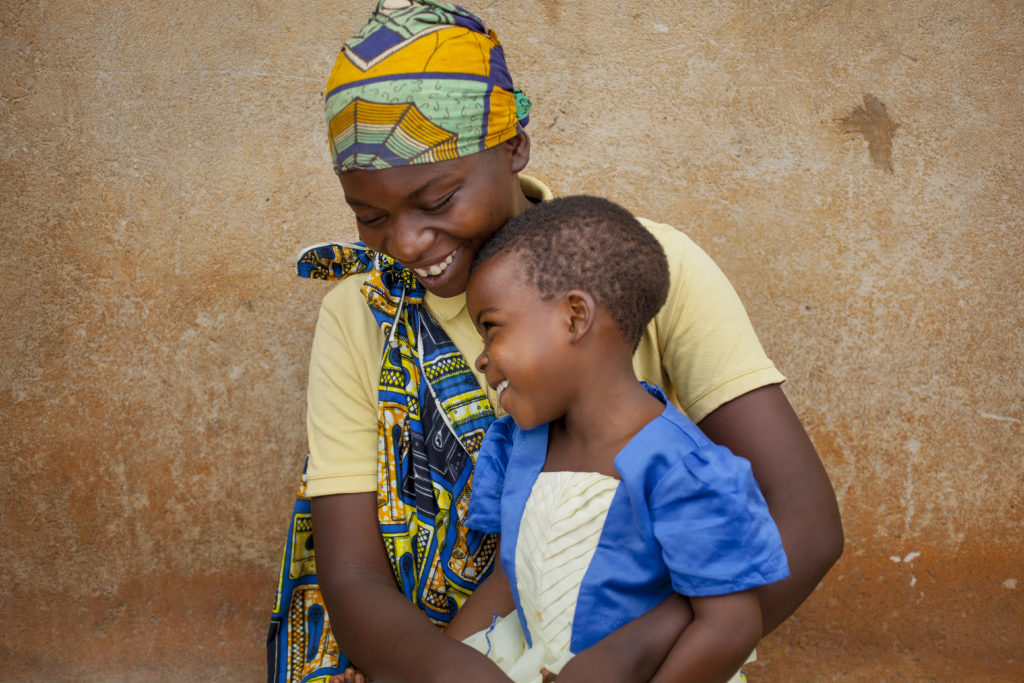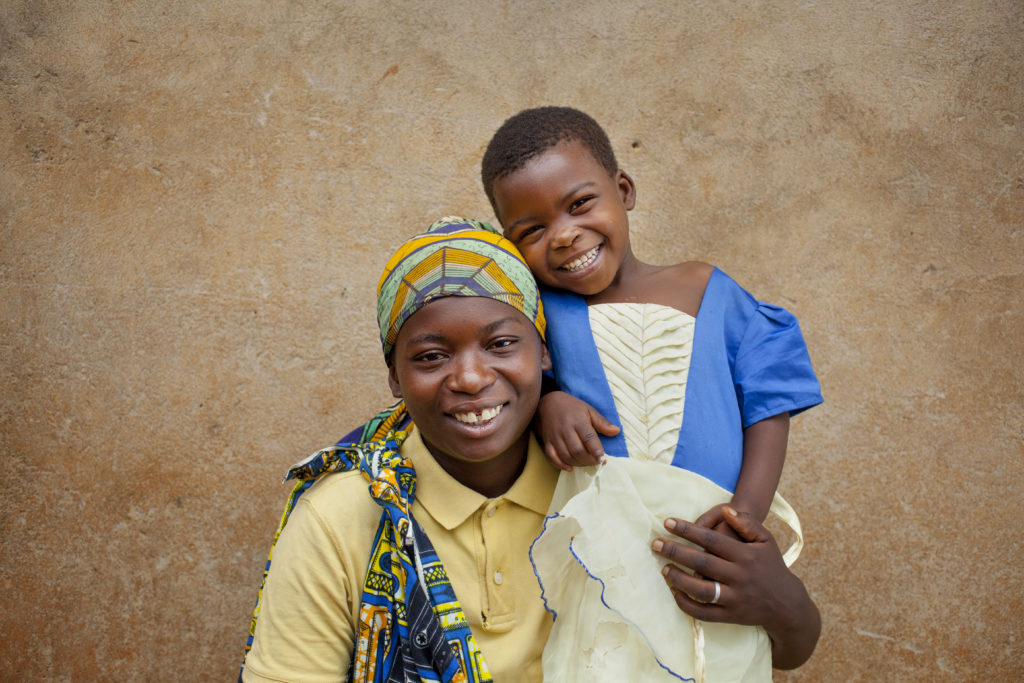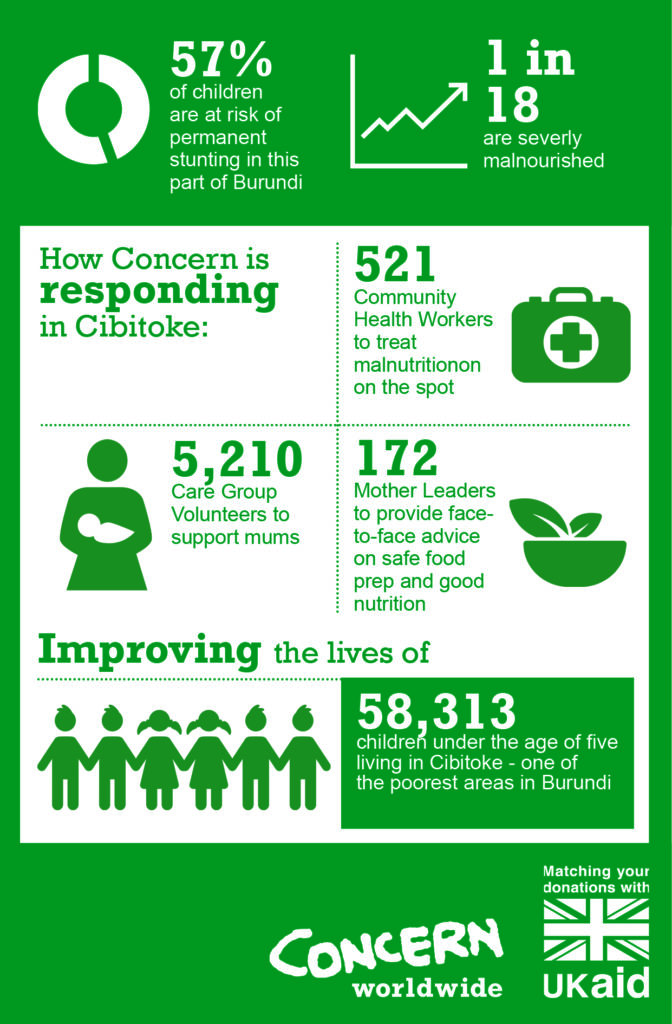Concern Worldwide’s Darren Vaughan recently visited Burundi to see how funding from last year’s Food in a Fragile World appeal – supported by The Irish Post - is making a difference to tens of thousands of children facing a lifetime of hunger.
“She’s energetic and bouncing with life,” says 25-year-old mum Clotilde Ndayisenga as she attempts to squeeze a hug from her second youngest daughter, Ines.
The five year old finds it difficult to stay still for a moment as we sit on a bench outside the two-room family home in a rural village in Rugombo. The draw of playing with her friends a few metres away is just too much for her.
“She loves to be involved in everything," says Clotilde, "especially helping to prepare food and cook. She's quick to learn."
The proud mum of four is thankful that Ines and her other children are growing up strong and healthy. She puts it down to a combination of a varied and nutritious diet and the help and advice of community-based health workers, carers and volunteers supported by international development charity Concern Worldwide.

Married mum-of-four Clotilde Ndayisenga (25) and her five-year-old daughter Ines, Rugombo, Cibitoke, Burundi
Burundi is one of the poorest countries in the world, where more than a third of the population don’t have enough food to eat. Poverty, political instability and scarce rainfall all contribute to high levels of food insecurity and hunger. And children, who make up around half the population, are disproportionately affected.
What makes it even more of a challenge is that Clotilde and her family live in Cibitoke – an area with one of the highest levels of chronic malnutrition in the country. Every other child living there is chronically malnourished.
Hunger prevents them from developing. It causes stunting and weakens their immune systems making them more susceptible to diseases. Their ability to grow and learn is permanently damaged. By the time they are two years old, the effects of chronic malnutrition are irreversible.
The overall level of acute malnutrition in the area is also poor, with one in every 18 children moderately or severely malnourished. Last year, the UN estimated that as many as 1.2 million children in Burundi were impacted, with almost 63,000 under-fives requiring treatment for severe malnutrition.

Clotilde Ndayisenga and her five-year-old daughter Ines
It is for that reason that aid agencies like Concern are targeting pregnant women, and mums with young children. The aim is to prevent malnutrition in the first place or spot the early signs before it takes hold.
A few kilometres away, we meet another 25-year-old mum, Charlotte Nzeyimana. She has been walking for almost two hours carrying baby Keddy on her back and with four-year-old daughter Kyntia by her side.
In the shade of a banana grove, Charlotte shares her concerns about young Kyntia, who sits motionless on the ground beside her. “My daughter is not very healthy,” she says.
Seven months ago little Kyntia was diagnosed with oedema – a symptom of severe acute malnutrition. She was admitted to hospital and recovered after a month. But her situation remains precarious.
“I breastfed her until she was three years old," says Charlotte. "After that, she began to get sick. She has never had a varied diet – and has only ever eaten cassava paste."
In the next few weeks, though, Charlotte will begin to reap the benefits of the same vital health and nutrition advice and support that Clotilde enjoys.
The programme, which started in July, is run by Concern with funding from the UK government. Last year, as part of the overseas charity’s Food in a Fragile World appeal, the public donated just over £850,000 which was matched pound-for-pound by the government. That matched funding is now being used in this part of Burundi to help improve the lives of more than 58,000 under-fives at risk of malnutrition.
At the heart of Concern's efforts to tackle hunger is a team of 521 skilled Community Health Workers (CHWs). They are trained to detect the early signs of malnutrition on the spot and treat certain illnesses and infections. Concern also supports 5,210 Care Group Volunteers and 172 Mother Leaders who promote breastfeeding and good nutrition, food preparation and hygiene practices.
"We rely on our Community Health Worker," says Clotilde. "She has treated my children for malaria and diarrhoea. And if they fall sick again, she will know what to do."
Both Clotilde and her husband earn what they can from casual work cultivating cassava and corn. Between harvests and during lean times they sell eggs, buns, soap and home-made banana juice to friends and neighbours. It is enough for them to survive on.
"The CHW has told us the importance of having a balanced diet,” she says. “We eat twice a day - mostly beans, corn, rice, cassava paste, sweet potatoes and vegetables.”
On a steep hillside in Bukinanyana not far from where we met Charlotte, Community Health Worker Jeannette Icimanishatse is greeted by shouts and laughter. The 52-year-old grandmother is visiting one of ten households on her weekly rounds. It is clear that she has gained the trust and respect of her neighbours, encouraging them to take simple preventative measures to positively impact their children’s lives.
“I am proud of what I do,” says Jeanette. “Mums depend on us for help. It is rewarding to know that we are doing something to make the life of the community better.”
Community Health Workers like Jeannette refer any cases of severe acute malnutrition to the local health centre for specialist treatment. They even help to arrange transport and encourage mums to save a little for emergencies. Mothers whose children are moderately malnourished are enrolled in community-based nutrition demonstrations where they receive advice on key feeding and care practices. They are also given support to build a kitchen garden which enables them to have vegetables all year round, and an opportunity to be part of a savings and loans scheme.
It is a highly effective approach, according to Sebastien Sebahizi, Concern’s Health and Nutrition Programme Manager in Cibitoke, because it focuses on behaviour change and peer-to-peer communication.
“What we have observed,” he says, “is that some mothers in exactly the same living conditions have children who are healthy. We bring them into the programme as Mother Leaders and Care Group Volunteers, so that mums who are struggling can spend time with them and see how it’s done.”
A further spin-off from tackling malnutrition at grassroots level is that less of a strain is placed on the therapeutic and stabilisation services provided by local clinics.
“What we hope to achieve,” says Sebastien, “is to halve the number of childhood nutrition-related consultations in local health centres. That will ease the pressure on the system and enable medical staff to deal with more complicated cases.”
“But ultimately, our goal is to reduce childhood malnutrition and give more young children the opportunity to grow up healthy and well. It is something each one of them deserves.”

How Concern's Food in a Fragile World campaign is helping the community in Cibitoke
 Married mum-of-four Clotilde Ndayisenga (25) and her five-year-old daughter Ines, Rugombo, Cibitoke, Burundi
Married mum-of-four Clotilde Ndayisenga (25) and her five-year-old daughter Ines, Rugombo, Cibitoke, Burundi Clotilde Ndayisenga and her five-year-old daughter Ines
Clotilde Ndayisenga and her five-year-old daughter Ines
 How Concern's Food in a Fragile World campaign is helping the community in Cibitoke
How Concern's Food in a Fragile World campaign is helping the community in Cibitoke